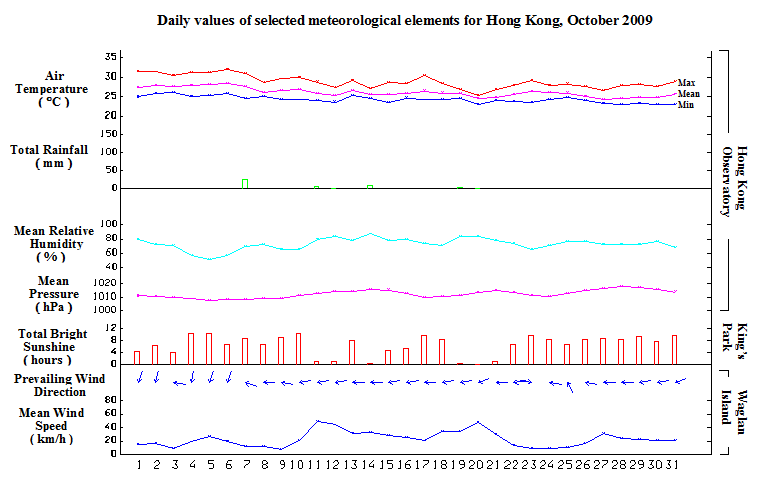The Weather of October 2009
|
October 2009 was warmer and drier than usual. The mean temperature of the month was 26.2 degrees, 0.9 degrees above the normal of 25.3 degrees. The daily minimum temperatures during the month never fell below 23.0 degrees, which only occurred once on record in 2006. The total rainfall of 44.4 millimetres in the month was about 71 percent below the normal figure of 151.9 millimetres. The accumulated rainfall since 1 January was 2071.7 millimetres, about 10 percent below the normal figure of 2313.1 millimetres for the same period. Affected by a dry northeast monsoon over southern China, the weather in Hong Kong was generally fine and dry for the first six days of the month. Brief showers occurred on the morning of 7 October and fine and dry weather resumed for the next three days. Tropical Storm Parma entered the South China Sea on 9 October and moved across the northern part of the South China Sea on the next day. Under the combined effect of the northeast monsoon and Parma, the weather in Hong Kong became windy with a few rain patches from 11 to 14 October. With the dissipation of Parma over Vietnam on 15 October, local winds moderated and the weather became brighter with some haze on 15 and 16 October. It was sunny and dry on the next two days. An area of low pressure over the northwestern part of the South China Sea intensified into a tropical depression on 19 October. Under the influence of the peripheral rain bands associated with the tropical depression, local weather turned cloudy with a few rain patches. The northeast monsoon over southern China strengthened on 20 October, bringing cloudy, windy and slightly cooler weather to Hong Kong on that day. It remained cloudy on the next day. With the moderation of the northeast monsoon, the weather turned fine and dry on 22 October. Affected by a dry continental airstream, the weather continued to be mainly fine and dry over the territory till the end of the month. Six tropical cyclones occurred over the western North Pacific and the South China Sea in the month. Details of issuance and cancellation of various warnings/signals in the month are summarized in Tables 1.1 to 1.2. Monthly meteorological figures and departures from normal for October are tabulated in Table 2. |
Warnings and Signals issued in October 2009
| Beginning Time | Ending Time | ||
|---|---|---|---|
| Day/Month | HKT | Day/Month | HKT |
| 11 / 10 | 0250 | 12 / 10 | 1610 |
| Colour | Beginning Time | Ending Time | ||
|---|---|---|---|---|
| Day/Month | HKT | Day/Month | HKT | |
| Yellow | 1 / 10 | 0600 | 1 / 10 | 1800 |
| Yellow | 2 / 10 | 1800 | 4 / 10 | 0600 |
| Red | 4 / 10 | 0600 | 4 / 10 | 1800 |
| Red | 5 / 10 | 0600 | 7 / 10 | 0355 |
| Red | 7 / 10 | 1200 | 9 / 10 | 1800 |
| Yellow | 10 / 10 | 0600 | 11 / 10 | 0600 |
| Yellow | 17 / 10 | 1100 | 18 / 10 | 1800 |
| Red | 23 / 10 | 1130 | 24 / 10 | 0600 |
| Yellow | 24 / 10 | 0600 | 26 / 10 | 1800 |
| Yellow | 31 / 10 | 0600 | 1 / 11 | 1800 |
| Meteorological Element | Figure of the Month | Departure from Normal* |
|---|---|---|
| Mean Daily Maximum Air Temperature | 28.9 degrees C | 1.2 degrees above normal |
| Mean Air Temperature | 26.2 degrees C | 0.9 degree above normal |
| Mean Daily Minimum Air Temperature | 24.3 degrees C | 0.9 degree above normal |
| Mean Dew Point Temperature | 20.8 degrees C | 0.9 degree above normal |
| Mean Relative Humidity | 73 % | 1 % below normal |
| Mean Cloud Amount | 59 % | 2 % above normal |
| Total Rainfall | 44.4 mm | 107.5 mm below normal |
| Number of hours of Reduced VisibilityΔ | 248 hours | 77.5 hours above normal§ |
| Total Bright Sunshine Duration | 202.6 hours | 11.5 hours above normal |
| Mean Daily Global Solar Radiation | 14.74 Megajoule / square metre | 0.28 Megajoule above normal |
| Total Evaporation | 120.2 mm | 16.2 mm below normal |
| Remarks : | All measurements were made at the Hong Kong Observatory except sunshine, solar radiation and evaporation which were recorded at King's Park Meteorological Station and visibility which was observed at the Hong Kong International Airport. |
| Δ |
The visibility readings at the Hong Kong International Airport are based on hourly observations by professional meteorological observers in 2004 and before, and average readings over the 10-minute period before the clock hour of the visibility meter near the middle of the south runway from 2005 onwards. The change of the data source in 2005 is an improvement of the visibility assessment using instrumented observations following the international trend. |
* Departure from 1971 - 2000 climatological normal, except for number of hours of reduced visibility |
|
§ Departure from mean value between 1997 and 2008 |
|
